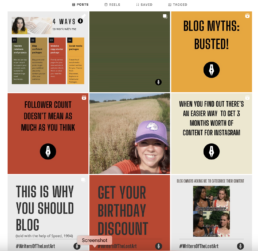
10 Reasons you should be blogging for your business
Businesses should blog. But not without purpose. It’s better to write nothing than to write something so unhelpful that it will turn people off. But knowing where to start often grabs people in a procrastination death grip.
So here is where you start!
I’m going to tell you 10 benefits of blogging, so you’ll truly understand how powerful it can be.
Bebe! Come with me.
Why is blogging important?
Before I get into the actual 10 benefits of blogging for your business, let’s just cut straight to the chase. If you’ve got a business with an online presence, whether it’s product or service based, you want people to buy from you. No one is living for free. We all need to make money. So don’t be coy about it.
Every reason in this list ultimately leads to more sales. They might not be reasons that you can easily and directly attribute to a sale, but they matter. Just look at these stats:
- Marketers who prioritise blogging are 13x more likely to have a positive ROI on their efforts.
- 61% of the most effective B2B content marketers meet with their content team daily or weekly.
- 64% of B2B marketers outsource blog copywriting.
- 60% of marketers have a documented personalization strategy.
- 57% of marketers say they’ve gained customers specifically through blogging.
- 53% of marketers say blogging is their top content marketing priority.
- B2B marketers who have blogs get 67% more leads than those who don’t.
- Around 60% of marketers will reuse blog content 2-3 times.
10 Business blogging benefits
1. Increase visitors to your website
If you’re already on someone’s radar, great. They can type your name straight into Google and reach your site. But if they’re not aware of you, they’re more likely to type in a question or a statement – maybe a product name. Every time you publish a blog post that talks about what you sell, answers questions and helps your audience make a more informed choice, you’re serving up another path, straight to your door.
Not only that, but most of your website pages probably stay pretty much the same, the majority of the time. Updates might be rare. But blog posts? Blogs can be updated as often as you want, and every time your site is updated, it sends a cue to search engines that you’ve got an active website that’s being updated regularly and they should frequently be checking it for any new and helpful content.
2. Increase visibility of your website
Picture this: You’re a life coach. You sell life coaching 1-1 packages. Someone is fed up with feeling stuck in their life and they type into Google, “How to stop feeling stuck in life”. Up pops a number of websites offering advice on how to come unstuck. Yours doesn’t. Because although you offer a service that does exactly that for people, you don’t really talk about it on your website.
The more genuinely helpful questions you can answer and content you can provide for your audience, no matter what state of awareness they’re in, the more chance you’ll have of showing up in search results when someone needs you to.
3. Grow your email list
If you follow me on LinkedIn or Instagram, you’ll know that I talk often about claiming your owned content. That is, content and information that can’t be whipped away from you when a platform goes offline, has a glitch or, shock-horror, the internet goes down.
Social media doesn’t belong to you. An email list of subscribers, does!
Adding conversion-focused opt-in forms or CTA hyperlinks and buttons to your blog posts means that if people land there through other means, they can add themselves to your email list to make sure they’re kept up to date with any news you want to share with them on a regular basis.

4. Attract new customers
Blogging for your business helps you get discovered. Not just through search engines, but through social media and emails too. Giving people content that is shareable helps to expose your business to new audiences, AND, (my favourite part), gives you content that you can break up, repurpose and refresh for your social platforms. Your blog and your social media should work hand in hand to make it easier for you to create content. One feeds the other, keeping everything relevant and cohesive. Two things your audience will love!
5. Delight returning customers
Delighting customers is about giving them such a great customer experience that they come back for more and rave about you to their peers. Got a loyalty programme for your business? Blog about it. A recycling scheme for your packaging? Blog about it. A reward system for when a customer gives feedback? Blog. about. It!
Let the world see how much you care about your customers not just before they buy, but after the sale too.
6. Educate and engage
Many purchases online are made after the buyer has researched the product. They may want to understand how it works, how it’s made, what values your company has. Blogs are a part of this buyer journey. But it’s very rarely a linear journey. They might hop from a blog post to a customer review platform and then forget about it for a while. A couple of weeks later they might find you on social media and then go back to another blog post. They might even return to the same blog post multiple times. The journey can last a few hours, days, weeks or even months. Which is why it’s important to keep on answering questions from potential customers, and addressing their pain points and barriers to buying. But do so in a way that is engaging. Because you want them to take the next step in their journey. And the next one after that. Until they’re ready to buy.

7. Build trust
Building trust is such a key component of creating any content for your business. Google guidelines advise following E-E-A-T principles. Experience, Expertise, authoritativeness and Trustworthiness. The most important of these elements is trust. That’s because Google says, “untrustworthy pages have low E-E-A-T no matter how Experienced, Expert, or Authoritative they may seem.” People are more likely to buy from brands they trust. They’re more likely to return to brands they trust. They’re more likely to advocate for brands they trust. Blogging helps to build that trust by showing you have experience, expertise and are an authority in your industry / market. It gives you the opportunity for people to see behind the scenes and know the values of your business too.
8. Expand your brand
Blogs can be shared and commented on. It doesn’t have to be a one-way thing. And the more people engage with it, and share it, the more reach your brand will have. Which means increased brand awareness and new audiences.
9. Drive conversions
It’s quite rare that someone will land on a blog post and immediately purchase what you have to offer. But, they are a very important part of the buyer journey and can nudge people one step closer to conversion. They can do this by including eye-catching headlines, talking about benefits rather than features, using images and videos, having persuasive calls to action and being written with the right audience in mind.
10. Separate yourself from your competitors
If you can provide what your competitor cannot, you’re going to increase your chances of building trust, search visibility, brand awareness and all of the other 9 points in this list.
So there you have it. TL:DR – There are lots of great benefits of blogging for your business, all of which ultimately drive revenue. So if you’re not blogging, why not?
Blogging without a plan however is just going to give you a scattergun approach. So if you don’t know where to start, get in touch for a chat. I’ll help you figure out what that first step is for you and your business.
June 28, 2024
How to write a homepage
April 18, 2024
Is your AI content safe to use?
September 4, 2024
799 Spam Words To Avoid
April 18, 2024





